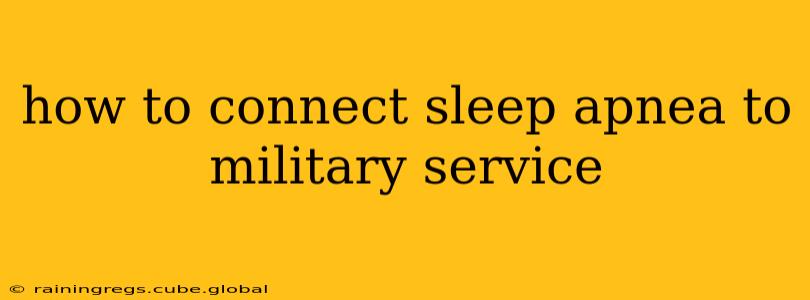Sleep apnea, a serious sleep disorder characterized by pauses in breathing during sleep, affects millions worldwide. For veterans, establishing a connection between their sleep apnea and military service can be crucial for accessing vital healthcare benefits and compensation. This comprehensive guide explores the pathways to connecting sleep apnea to your military service, addressing common questions and concerns.
What is the Connection Between Sleep Apnea and Military Service?
Many factors associated with military life can contribute to the development or exacerbation of sleep apnea. These include:
-
Exposure to loud noises and traumatic events: Prolonged exposure to loud noises, a common occurrence in military settings, can damage hearing and contribute to sleep disturbances, increasing the risk of sleep apnea. Similarly, the stress and trauma experienced during service can significantly impact sleep quality.
-
Shift work and irregular sleep schedules: Military personnel often work irregular hours and shift patterns, disrupting their natural sleep-wake cycle (circadian rhythm), making them more susceptible to sleep disorders like sleep apnea.
-
Physical injuries: Injuries sustained during military service, such as neck or head injuries, can affect airway function and increase the likelihood of developing sleep apnea.
-
Obesity: Stress, poor diet, and limited access to exercise during deployment or intense training can contribute to weight gain, which is a significant risk factor for sleep apnea.
-
Exposure to certain chemicals and toxins: Exposure to various chemicals and toxins during military service, particularly during deployments, may potentially contribute to the development of sleep apnea, although more research is needed in this area.
How Can I Prove My Sleep Apnea is Service-Connected?
Proving a service connection for sleep apnea requires gathering substantial evidence demonstrating a link between your condition and your military service. This often involves:
-
Medical records: Thoroughly review your military medical records for any documentation related to sleep disturbances, snoring, daytime sleepiness, or any related conditions. Even seemingly minor entries can be valuable.
-
Buddy statements: Statements from fellow service members who can attest to witnessing symptoms of sleep apnea (loud snoring, pauses in breathing, daytime sleepiness) during your service can provide crucial supporting evidence.
-
Private medical records: Your private medical records documenting your diagnosis and treatment for sleep apnea should be submitted as well. This includes sleep studies (polysomnograms).
-
Lay statements: Detailed accounts from family members or friends regarding your sleep disturbances during and after your service can offer additional context.
-
Medical opinion: A medical professional experienced in evaluating service-connected disabilities can provide an expert opinion on the likelihood of a connection between your sleep apnea and your military service. This is often a crucial component of a successful claim.
What if My Sleep Apnea Wasn't Diagnosed During My Service?
Even if sleep apnea wasn't diagnosed during your active service, you may still be able to establish a service connection. The key is to demonstrate a plausible link between your military experiences and the onset or worsening of your condition. A medical professional can assist in establishing this link by considering your service history and medical records.
What are the VA Disability Benefits for Sleep Apnea?
The VA rates sleep apnea based on its severity and impact on daily life. The rating is determined by the extent of the sleep apnea and how it affects your ability to perform daily tasks. This rating then determines the level of monthly compensation you may receive.
How Long Does the Process Take?
The process of connecting your sleep apnea to your military service can take several months, sometimes even years. Persistence and thorough documentation are critical.
Where Can I Find More Information and Assistance?
The Department of Veterans Affairs (VA) website offers extensive information on disability claims, including those related to sleep apnea. You can also seek assistance from veterans' service organizations, legal professionals specializing in veterans' benefits, or your personal physician.
Remember, seeking professional help from a qualified medical professional and a veterans' benefits advisor can significantly increase your chances of a successful claim. The journey might be lengthy, but with diligent effort and the right resources, you can increase your chances of securing the benefits you deserve.
